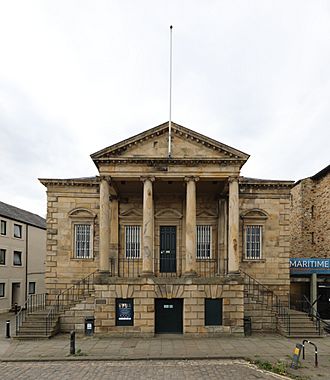Custom House, Lancaster facts for kids
Quick facts for kids Custom House |
|
|---|---|

The front of the Custom House
|
|
| Alternative names | Maritime Museum |
| General information | |
| Architectural style | Palladian |
| Location | St George's Quay, Lancaster, Lancashire, England |
| Coordinates | 54°03′13″N 2°48′19″W / 54.0537°N 2.8053°W |
| Renovated | 1983–84 (restored) |
| Design and construction | |
| Architect | Richard Gillow |
|
Listed Building – Grade II*
|
|
| Official name: Maritime Museum | |
| Designated: | 22 December 1953 |
| Reference #: | 1289088 |
The Custom House is a very old and special building in Lancaster, Lancashire, England. It sits right by the water on St George's Quay. This building is so important that it is called a Grade II* listed building. This means it has special historical or architectural value and is protected.
The Custom House was designed in 1764 by an architect named Richard Gillow. He came from the famous Gillow family, who were well-known for making furniture in Lancaster and London. The building was first used by the Port Commissioners. They were in charge of collecting taxes on goods coming into or leaving the port. This continued until 1882, when the customs office moved to Barrow-in-Furness.
Lancaster Maritime Museum
Since 1985, the Custom House has been home to the Lancaster Maritime Museum. This museum helps people learn all about the history of the sea and trade in Lancaster. Right next to the Custom House, there is an old warehouse. This warehouse was once used to store goods that had not yet had their taxes paid. Today, it is also part of the Maritime Museum.
What You Can See at the Museum
The museum has many interesting things to explore. You can see models of ships and learn about the different kinds of boats used for fishing in the area. There are exhibits about the important merchants who traded goods long ago. You can also learn about the Lancaster Canal, which was a busy waterway for moving things.
The museum also shows how the local ports grew over time. These include places like Glasson, Heysham, Sunderland Point, and Morecambe. You can discover the natural history of Morecambe Bay, which is a large bay with unique wildlife. The museum helps visitors understand the social history of the area too, showing how people lived and worked by the sea.
See also
- Grade II* listed buildings in Lancashire
- Listed buildings in Lancaster, Lancashire
- Sandside, Beetham
External links
- Lancaster Maritime Museum website

